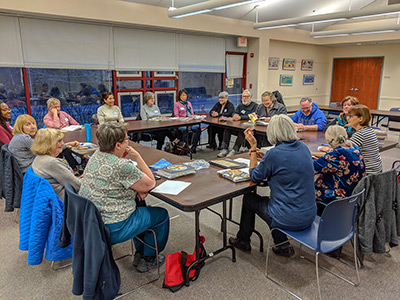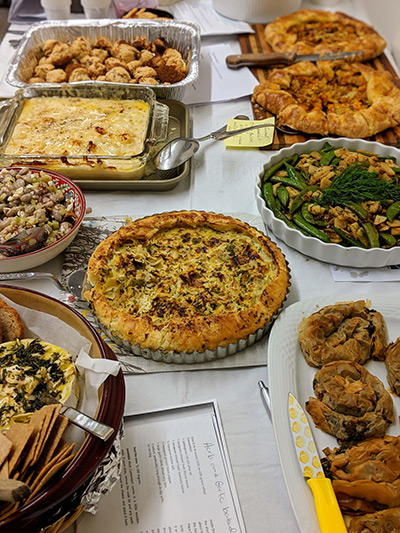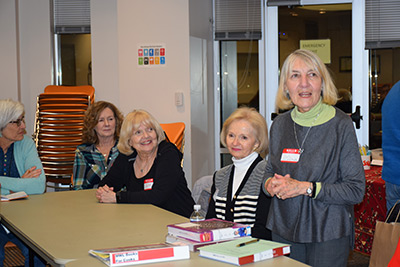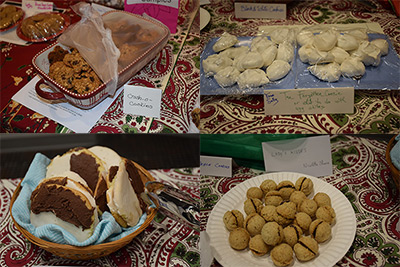Do you enjoy reading and cooking? Have you ever thought of combining the two into a book club focused on cookbooks? In this extensive Q&A, Marie and Sally share everything you need to know to start your own cookbook book group!
Davina: Hi Sally and Marie, I'm so excited to hear about your cookbook book clubs, so without further ado, let's dive in! Firstly, Sally, what's the name of your group, what's your role in it and how did it get started?
Sally: Our group is called Books for Cooks and we're affiliated with Martha Washington Library, which is one of the branches of Fairfax County Public Library (FCPL) in Alexandria, Virginia. I'm the volunteer organizer and facilitator; my background was as a public school reading teacher and professional literacy staff developer, and now that I'm retired, I enjoy running a number of book clubs including Books for Cooks.
Davina: I just love the idea of a cookbook book club, melding two of the most important things in so many of our lives. Where do you meet?
Sally: Pre-pandemic we met at Martha Washington Library. Previously I had attended Cook the Book! meetings at FCPL's George Mason Library, facilitated by librarian Marie Cavanagh, so as to learn how to organize a cookbook book club. Using a template developed by Marie, the Martha Washington Library group began in February 2019, meeting on the first Tuesday of the month, while Marie's already established George Mason group met on the third Monday of the month, with some folks attending both.
Davina: So now FCPL has two cookbook groups. What fun! Marie – can you share a bit about how you came to start a cookbook book club?
 Marie: I'd be glad to! Fairfax County librarians are responsible for creating programming. In the beginning, I organized programs around many different topics with varying degrees of success. Finally, it dawned on me that I would be happier and the programs would be more successful if I were interested in them, rather than guessing what other people wanted. I have friends who like to cook and talk about food, recipes and chefs so I recruited them to help me start a cookbook club. I launched Cook the Book! in October 2017 with a discussion of Essentials of Classic Italian Cooking by Marcella Hazan.
Marie: I'd be glad to! Fairfax County librarians are responsible for creating programming. In the beginning, I organized programs around many different topics with varying degrees of success. Finally, it dawned on me that I would be happier and the programs would be more successful if I were interested in them, rather than guessing what other people wanted. I have friends who like to cook and talk about food, recipes and chefs so I recruited them to help me start a cookbook club. I launched Cook the Book! in October 2017 with a discussion of Essentials of Classic Italian Cooking by Marcella Hazan.
Davina: What a good idea to follow your interests, and I imagine there was no shortage of willing participants! Do members buy their cookbooks or borrow from the library? I know FCPL is a big library system but there must be a limited number of titles with enough copies for a large group?
Marie: Most do borrow from the library and finding enough copies of a single book has been a challenge. Initially, we were limited to using cookbooks with at least 20 copies in the library system; but overtime, I started to combine several titles by the same author or several titles about a specific cuisine to get around the "20 copies" rule—although it's not optimal as the conversation does go better if everyone uses the same book.
Davina: Tell us about a typical meeting?
 Marie: The group grew and changed over the years but always welcomed new members. Participants were encouraged to check out the month's cookbook from the library, skim through it, read the Introduction and several recipes, including the headnotes and try at least one recipe, and then share what they learned and what they liked or didn't like.
Marie: The group grew and changed over the years but always welcomed new members. Participants were encouraged to check out the month's cookbook from the library, skim through it, read the Introduction and several recipes, including the headnotes and try at least one recipe, and then share what they learned and what they liked or didn't like.
Usually, everyone made at least one thing but more often than not most attempted several. One participant faithfully made six to eight recipes from each book and she's been coming since the beginning. Up until March 2020, we met in person and people brought samples to share and the meetings felt like a huge dinner party. I think the most we ever had was about 27 sitting around the table. On average, about 18-22 people attended.
The cookbooks have taught us a lot, but we've learned just as much from each other and many friendships have formed.
Davina: That does sound such fun! But you refer to the group in the past tense. Are you still meeting?
Marie: Cook the Book! met virtually from March 2020, but sadly our final meeting was last November because I plan to retire in early 2022. At our final meeting we discussed It's Always Freezer Season: How to Freeze Like a Chef with 100 Make-Ahead Recipes by Ashley Christensen and Kaitlyn Goalen.
We appreciated the information about using a freezer efficiently and several of us bought new gadgets, like Souper Cubes, reorganized our freezers and threw out anything older than a year or two (or four!) The members thanked me profusely and said farewell. Cook the Book! turned out to be one of my favorite things ever and luckily there is a home for everyone in Books for Cooks.
Davina: Thank you Marie; it's so inspiring to hear how you grew the group by following your interests, and in the process inspired Sally's group to start up. I have a feeling that this interview will result in a number of others following your example!
So, back to Sally and her Books for Cooks group: Do tell us more about your group. For starters, how have you managed during the pandemic?
Sally: When the pandemic occurred, Books for Cooks switched from meeting in person to using my family's personal zoom account (because I am a volunteer with the library and not a professional librarian like Marie, I did not have access to FCPL's virtual tools). Recently, the head librarian at Martha Washington, Cathy Noonan, offered me the use of FCPL's Zoom platform, but I declined because we're at optimum capacity for a book group (averaging 20+ per meeting); if we were to use FCPL's system, the event would be advertised in their events calendar countywide and perhaps result in even higher attendance than is preferable for a book discussion.
Davina: I can see that the group could easily grow too big if open to the entire library system, particularly with the ease of joining a virtual group. How do you manage your current membership?

Additionally, the RSVP is a reminder to the members to try some of the recipes in the cookbook or by the author we'll be discussing, if they have not already done so.
Davina: It sounds like you have an enthusiastic group. How many do you have registered as members and how many typically attend a meeting? Also, what time of day do you meet?
We meet virtually at the same time and day that we did in person, on the first Tuesday of the month at 7pm.
How are your meetings structured?
 Sally: When we met in person, members signed in and put on name tags. They also brought with them a dish from the month's cookbook(s), including the name of the recipe and page number (or the website source if they found the recipe online). Then we shared what worked and what didn't in the recipes, and what we liked or didn't care for in the recipes and book in general – and all the while we were munching the samples members had brought.
Sally: When we met in person, members signed in and put on name tags. They also brought with them a dish from the month's cookbook(s), including the name of the recipe and page number (or the website source if they found the recipe online). Then we shared what worked and what didn't in the recipes, and what we liked or didn't care for in the recipes and book in general – and all the while we were munching the samples members had brought.
That sounds such fun! It also sounds like a lot of eating and discussion to fit into just one hour. When you were meeting in person, were you ever tempted to increase the length of meetings?
Sally: I have not been as one hour has always seemed sufficient.
Davina: Did the format change when you started meeting on Zoom? I imagine you must be missing sharing all the dishes?
Sally: Yes, we do truly miss our "dinner parties." During the check in time on Zoom, many participants will post the name of a recipe they've tried into the chat screen, including either its page number or the website URL. Sometimes, they also post a picture of what they made, or comment on cooking strategies and why or why not the recipe merits repeating. After each meeting, I send a summary to all the members (not just those who attended) and I attach the entire chat as reference.
Davina: Do you think you'll stay meeting on Zoom or go back to meeting in person?
Sally: I'm unsure at this point because we've added a dozen new members since we started using Zoom. Those new Books for Cooks members live far away from the Martha Washington Library, where we originated, and instead rely on Zoom to participate.
Also, meeting in person requires time invested in setting up the room in advance and clean up with the help of other book group members as the library has no maintenance staff to assist us (tables are light, but the designer chairs are notoriously heavy).
Typically, we would set up a display table of the next month's cookbook(s) available for check out; and two swap tables: one for recipe books that members either wanted to swap or donate to the library's used book sale; and another table for extra cooking supplies for swapping. In addition, a sign-in table was provided for name tags (on which participants wrote both their name and the recipe they were sharing) and extra copies of handouts for new members listing the year-long schedule and a description of how meetings are organized. Last, for sharing food samples, at least two serving tables were arranged with cloths, cards for labeling the different foods, cutlery, plates, serving supplies, and a recycle bin!
Lacking storage space at the library, it was necessary for me, or other volunteers, to tote these items back and forth from home. With increased in-person attendance possible and always the book group goal of building community, it's better when as many members as possible are involved in "owning" the meeting and making it happen. The proverbial, "more hands make for lighter work" proves true!
Davina: I really enjoyed joining your group's Zoom meeting, and also appreciated the summary you sent after the meeting by email, because there were a number of recipes mentioned that had caught my interest that I didn't manage to note. Factoring in all the steps needed to run in person meetings, it sounds like meeting on Zoom might be easier for you?
So, members have asked me to consider different options:
Davina: Hmm, many options to consider and different interests to take into account; also, now that people have joined from outside your locality, I can see it would be difficult to go back to meeting in person all the time. As somebody who is also involved as a leader in other book groups, how would you say a cookbook group differs from other groups you've been involved in?
Sally: I currently organize three book groups. I have coordinated Martha Washington's Mystery Book Club for 21 years. Also, for four years, I've run a multi-genre adult book club that meets at Hooray for Books, an independent bookstore in Alexandria, on the First Wednesday of the Month. The significant difference with Books for Cooks is that when we used to meet in person, we would eat (and eat well!) and experiment with different foods to illustrate and support our discussion of the recipe book, chef or cuisine. The other two groups are all about the discussion of the book; and like Books for Cooks, they meet for just one hour.
Davina: What are some of the things you look for in a good cookbook?
Sally: A good index is really important, so as to be able to search by both recipe name and key ingredients. Recipes also need to be adequately tested; we've faced some where the cooking times are way too high or the salt content is over the top. Because we're mostly veteran cooks, we know to make adjustments, but these sorts of things sometimes trip us up and would probably cause problems for less experienced cooks if they were to follow the recipes exactly. Also, contextual information about the recipe is important, and sometimes the preparation times are unrealistically short or leave out steps. It's also important to have measurements in cups and metric. It seems that those who rely on conventional measurements find it hard to deal with metric while those who use metric seem to easily switch to cups.
Davina: What are some of the types of cooking you've covered so far?
Sally: We've looked at the influence of Mexican cooking and various countries in Africa. We've also looked at cooking strategies including roasting, and baking of pies and cookies; and we've spent a good number of meetings focused on plant-based cooking, both vegetarian and vegan, and increasing the number of plant-based meals in our recipe repertoire.
Davina: Which cookbooks would you say have been the group's favorites?
Sally: This question is a tough one because members are always on the lookout for the next best cookbook but generally still rely on tried-and-true favorites, so here goes a list:
Davina: How does your group source the books and how far ahead do you plan your reading schedule?
Sally: We schedule a year out based on recommended cookbooks featured in publications such as Booklist and The Washington Post, plus members' recommendations and requests. I check availability within the Fairfax County Public Library system trying to make sure there are at least 10 or more copies of any title available for circulation to members, but as we generally have more than 10 members, we specify a topic (the name of a chef, a cuisine, or a cooking strategy), and then list several recipe books that correspond to that topic, as well as a website for additional information.
One of the objectives of a library sponsored book club is to focus attention on books available in the library's system; Books for Cooks aims to increase cookbook circulation. The schedule is subject to change at any time; for example, early this year, we were to feature Molly Stevens and instead one of our members has a neighbor, Heather K. Jones, who is the co-author of the Skinnytaste series and blog with Gina Homolka – so, Heather is joining us for our January meeting and we'll save Molly Stevens for a later date.
One of the librarians at Martha Washington Library is the liaison with our group and by having a yearlong schedule, she is able to plan to have a number of the month's cookbooks available at that branch library for circulation to members; members can also request titles online for pick up at their nearest branch library.
Davina: Do you feel the members have grown as cooks during their time together?
Sally: Yes! Most emphatically – all of us would agree that we've increased our knowledge about shopping, food preparation, and cooking; about nutrition; about ingredients; about the needs of our planet and about our responsibilities as thoughtful stewards of this earth we call home.
How have we changed as cooks due to our monthly meetings? It's all about new learning that we obtain from each other through sharing what's happened with our monthly focus on a particular kind of cooking experience. By reading and discussing the genre of cookbooks by a chef, or about a cooking strategy or tool, or a cuisine, we mutually profit. Were we reading a recipe, preparing it in splendid isolation, and merely serving ourselves or our families, we wouldn't necessarily gain such new knowledge or have prior knowledge confirmed or refined. This goes for the newbie cooks among our membership as well as veterans, and even those who attend our meetings because they appreciate cooking but don't actually do the cooking themselves.
Davina: What advice would you give to somebody wanting to start a cookbook group?
Sally: First share your thinking with friends who you know like to cook – but don't limit potential membership to veteran cooks – welcome newbies too or even those who just plain appreciate food and admire those who prepare it. Next, check your public library to learn what kind of support you could get from personnel there and how broad their cookbook collection is. Lastly, hold a trial meeting.
I shared the Books for Cooks model with a friend in Baton Rouge and she started something similar with about 10 people in her neighborhood where meetings rotate to each other's homes, and they rely on being able to check out cookbooks from the library. They had a guest speaker at one of their meetings who was a food photographer and he told them how foods were spruced up for the purposes of taking a picture to match the text of the recipe. She regaled me with stories from the evening including how hair spray is very useful for putting a shine on a lot of dishes, including roasted turkey!
What fun! Thank you Sally and Marie, this has been truly fascinating. You have both provided so many tips for those who might want to start a cookbook club, or may just want to introduce the occasional cookbook into their group's repertoire. We could talk on and on, but I'm sure we've both got things we should be cooking!
Your guide toexceptional books
BookBrowse seeks out and recommends the best in contemporary fiction and nonfiction—books that not only engage and entertain but also deepen our understanding of ourselves and the world around us.